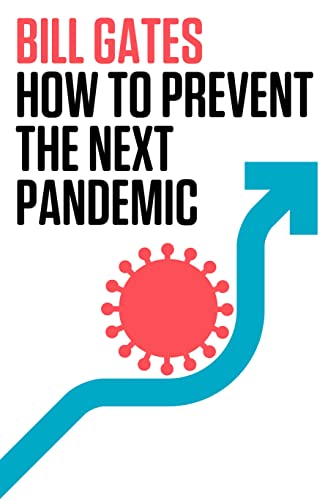All Categories


Get it between 2024-05-16 to 2024-05-23. Additional 3 business days for provincial shipping.
*Price and Stocks may change without prior notice
*Packaging of actual item may differ from photo shown
- Electrical items MAY be 110 volts.
- 7 Day Return Policy
- All products are genuine and original
- Cash On Delivery/Cash Upon Pickup Available








About How To Prevent The Next Pandemic
Product Description From the author of the #1 New York Times best seller How to Avoid a Climate Disaster: The COVID-19 pandemic isn’t over, but even as governments around the world strive to put it behind us, they’re also starting to talk about what happens next. How can we prevent a new pandemic from killing millions of people and devastating the global economy? Can we even hope to accomplish this?Bill Gates believes the answer is yes, and in this book he lays out clearly and convincingly what the world should have learned from COVID-19 and what all of us can do to ward off another disaster like it. Relying on the shared knowledge of the world’s foremost experts and on his own experience of combating fatal diseases through the Gates Foundation, he first helps us understand the science of infectious diseases. Then he shows us how the nations of the world, working in conjunction with one another and with the private sector, can not only ward off another COVID-like catastrophe but also eliminate all respiratory diseases, including the flu. Here is a clarion call—strong, comprehensive, and of the gravest importance—from one of our greatest and most effective thinkers and activists. Review “In this concise and lucid book, global health activist Gates reflects on the current COVID-19 pandemic, considers future ones, and renders several sensible recommendations for prevention . . . Passionate but never preachy, Gates delivers an expert, well-reasoned, and robust appeal for the world to unite in averting upcoming pandemics.” —Booklist (starred review)“Gates delivers a thoughtful exploration of how lessons learned from Covid-19 can inform future global public health policies. In accessible prose, he spells out steps for preventing future pandemics, among them creating a global task force dedicated to doing so . . . Gates is realistic about what he’s up against . . . but he does a good job of making [the task force’s] $1 billion price tag seem reasonable.” —Publishers Weekly About the Author BILL GATES is a technologist, business leader, and philanthropist. In 1975, he cofounded Microsoft with his childhood friend Paul Allen. Today, he is cochair of the Bill & Melinda Gates Foundation, where he has spent more than twenty years working on global health and development issues, including pandemic prevention, disease eradication, and problems concerning water, sanitation, and hygiene. He has three children. Excerpt. © Reprinted by permission. All rights reserved. IntroductionI was having dinner on on a Friday night in mid-February 2020 when I realized that COVID-19 would become a global disaster.For several weeks, I had been talking with experts at the Gates Foundation about a new respiratory disease that was circulating in China and had just begun to spread elsewhere. We’re lucky to have a team of world-class people with decades of experience in tracking, treating, and preventing infectious diseases, and they were following COVID-19 closely. The virus had begun to emerge in Africa, and based on the foundation’s early assessment and requests from African governments, we had made some grants to help keep it from spreading further and to help other countries prepare in case it took off. Our thinking was as follows: We hope this virus won’t go global, but we have to assume it will until we know otherwise.At that point, there was still reason to believe that the virus could be contained and wouldn’t become a pandemic. The Chinese government had taken unprecedented safety measures to lock down Wuhan, the city where the virus emerged—schools and public places were closed, and citizens were issued permission cards that allowed them to leave their homes every other day for thirty minutes at a time. And the virus was still limited enough that countries were letting people travel freely. I had flown to South Africa earlier in February for a charity tennis match.When I got back from South Africa, I wanted to have a


















